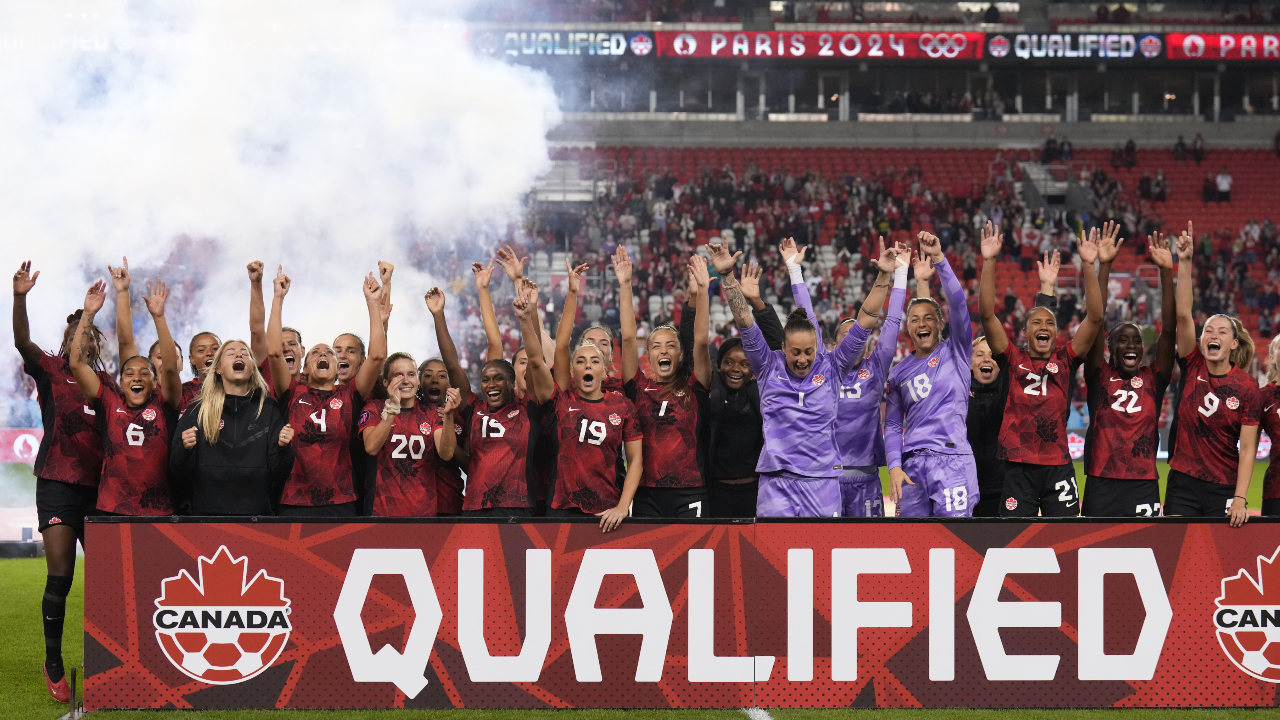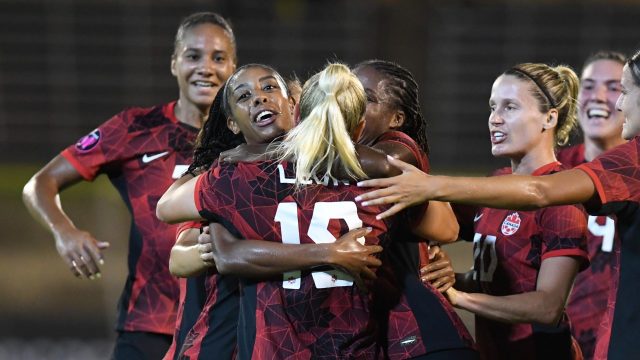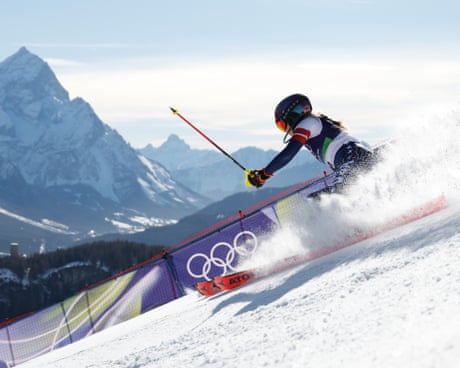
TORONTO – There is something about the Olympics that brings out the very best in the Canadian women’s team.
The quadrennial tournament has proven to be Canada’s salvation over the last 11 years, providing the team with a chance to redeem itself after a string of failed FIFA World Cup campaigns.
In 2011, Christine Sinclair and her cohorts finished in last place at the World Cup in Germany, only to rebound the following summer by winning its first-ever Olympic medal in London. The bad taste of a disappointing quarter-final exit at the 2015 World Cup on home soil was washed out of Canada’s mouth when it won a second consecutive bronze at Rio 2016. Canada saved the best for last when it struck gold at Tokyo in 2021, just two years removed from its lacklustre round-of-16 showing at the World Cup in France.
Now, Canada has the chance to use the 2024 Paris Olympics as a platform to once again restore its credibility and set things right after a disastrous showing at this summer’s World Cup in Australia when it became the first reigning Olympic champion to fail to advance out of the group stage.
The Canadians officially punched their ticket for Paris with a 2-1 win over Jamaica on Tuesday night at Toronto’s BMO Field before an announced sellout crowd of 29,212. Canada swept the two-legged Concacaf qualifying series after earning a 2-0 win in Jamaica last week.
“I think this team is better when they’re going after something,” Canada coach Bev Priestman said. “And I think, ultimately, we’re going after putting the wrong, right of that World Cup … the minute we’re in (the mindset of) defending a gold (medal), you’re taking a step backward.
“We’re going to go into that Olympics knowing off (what we learned at) the World Cup and I think we’ll come out swinging, and that’s when we’re at our best.”
Before this two-match playoff, Canada faced Jamaica nine times in international competition and won all nine games by a combined score of 60-1. But Jamaica, ranked No. 37 in the world, is a team on the rise after having survived a difficult group at this summer’s World Cup that included top-10 nations Brazil and France before losing to Colombia in the round-of-16. It marked the first time in two World Cup appearances that the Reggae Girlz advanced to the knockout round, so this two-match playoff was anything but straightforward for the 10th-ranked Canadians, who were still licking their wounds from the debacle Down Under.
Yet, Priestman’s side appears to have moved on from its embarrassing World Cup exit and went back to the basics against Jamaica, re-establishing itself as a team that can defend with the best of them, which is what led it to glory in Tokyo, Rio and London.
In the first leg, Canada comfortably contained the Jamaican attack led by Khadija “Bunny” Shaw, regarded as one of the top forwards in the women’s game and a finalist for this year’s prestigious Ballon d’Or award. In the return match, the Caribbean nation produced one moment of magic when Drew Spence scored on a majestic free kick to give the visitors a surprising 1-0 lead. Other than that, Jamaica never found a way to even remotely test Canada’s steely defence.
Veteran centre backs Kadeisha Buchanan and Vanessa Gilles, who both had poor World Cups while deployed in a standard back four, looked reborn playing alongside highly touted Jade Rose in a new-look three-woman defence.
You’d never know that Rose, a 20-year-old attending Harvard University, has yet to turn professional based on her performances for the national team. She’s a skilled defender who combines intelligence and athleticism, and it’s her masterful reading of the game that allows her to snuff out danger before it develops. Canada has a gem of a player in Rose, who was one of the team’s unheralded heroes in the first leg against Jamaica.
While Leon, Nichelle Prince, Cloé Lacasse and Jordyn Huitema will grab the headlines because of their goal-scoring exploits over the two legs, it has to be said that Canada largely booked its passage to Paris because of its resolute defensive play and organization at the back. For that, Buchanan, Gilles and Rose deserve a lot of credit.
“I think I’ve been on a journey now with a group of players who’ve had the ultimate high, probably had the ultimate low,” Priestman said. “And then I saw them come out swinging.
“The bit that inspires me about the group is character, fight, hard work, working for the person next to you … Everybody’s put a real shift in, players and staff, to do whatever we could to turn this around.”
What was also encouraging to see was how Priestman tweaked her lineup and made tactical adjustments from the World Cup, most notably switching from a 4-2-3-1 formation to a hybrid 3-5-2/3-4-3 setup. Fullback Ashley Lawrence was deployed as a wingback over the course of the two games and drove the Canadian forward with her probing runs down the right side. Canada greatly benefitted from the veteran starting in a more advanced position than she normally does, as she had a hand in setting up the winning goals in both games with a pair of dangerous crosses into the box.
Priestman also showed a lot of trust in defender Sydney Collins, who had just one cap to her credit coming into this series versus Jamaica. Collins, 24, made her professional debut in April with the NWSL’s North Carolina Courage but started both games of this Concacaf qualifier in midfield and distinguished herself with the maturity of her play. She provided Canada with a stabilizing presence in midfield while also effectively linking up with Lacasse in attack down the left side. Collins, by all accounts, looks to be a player of the future for Canada.
What was especially promising about Canada’s victory in this series was that Sinclair played a minimal role. An unused substitute in the first leg, the 40-year-old forward came off the bench for only the final 30 minutes on Tuesday with Canada sitting on a comfortable lead.
It shows how much this team has grown up and weaned itself off its longstanding dependence on its iconic captain that it navigated this do-or-die playoff without her. Such a scenario would’ve been unimaginable even a year ago.
It’s also telling that when Sinclair was subbed on, acting captain Jessie Fleming tried to give her the captain’s armband. Sinclair immediately waved her off in a symbolic passing of the torch. This is Fleming’s team to steer going forward, a fact recognized by Sinclair – if Canada is to win gold again in Paris, it’ll be with the Chelsea midfielder leading the way and Sinclair playing a supporting role, assuming she plans to stick around.
“Coming into this (international) window, Christine told me I want to get this team to the Olympics. … After this window, we’ll sit down, we’ll reflect,” Priestman said after Tuesday’s win.
John Molinaro is one of the leading soccer journalists in Canada, having covered the game for over 20 years for several media outlets, including Sportsnet, CBC Sports and Sun Media. He is currently the editor-in-chief of TFC Republic, a website dedicated to in-depth coverage of Toronto FC and Canadian soccer. TFC Republic can be found here.






